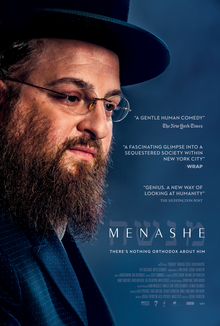
A while back I wanted to watch a Israeli television series, Srugim, after reading a lot of discussion about it but ran into trouble getting good English subtitles for it. I suppose it’s more readily available now that it’s more well known. In any case, Jewish media seems popular in the US recently and this film has been getting plenty of praise. It counts as an American film but is entirely in Yiddish, being about a community of Hasidic Jews who live in New York.
Menashe is a widower with a young son Rieven. Due to the rules of his community which require that children live in a household with a man and a woman, Rieven has to live with his brother in law Eizik instead. Menashe’s problems are compounded by his financial insecurity as he works in a local grocery store while Eizik is a successful real estate agent. Menashe resists the pressure to remarry as his own marriage was an unhappy one and tries to spend more time with Rieven. This worsens his problems as he needs to balance his working responsibilities with taking proper care of Rieven. As the date of the memorial of his wife’s death draws near, everyone assumes that it will be held at Eizik’s house. Menashe, knowing that Eizik looks down on him, insists on holding it in his own house as a way of proving that he can run his own household independently.
It’s a bit of a coincidence I suppose but Menashe is rather similar to Paths of the Soul in that both are fictional films that nonetheless feel much like documentaries about their respective exotic religious community. Without the element of them being Hasidic Jews, this would otherwise be a competent but unremarkable story of a single father struggling to raise his son. I do like that Menashe’s arc is grounded but I dislike how it resorts too easily to the usual tropes like him having difficulty waking up in the morning or Rieven getting hurt in a household accident. I also feel that having an important bit about how his marriage life was like be revealed only as part of a conversation with his Hispanic colleagues in English instead of a confrontation with his family members feels off.
Learning about the strictures and practices of the Hasidic Jews is of course both educational and fascinating. I was also surprised by how distinct and insular a community they seem to have made for themselves in the US, with their own shops, businesses, schools and so on. The director Joshua Weinstein goes for a neutral tone, exactly as if he were making a documentary, and so avoids judging them. At the same time, I can’t help but notice that many of these practices are in fact highly regressive. When Menashe meets another woman, a widow, for a date arranged by a matchmaker, she expresses disgust about how a particular rebbe allows women to drive and states that there is nothing more important for a woman in life that to be married and to have children. It makes a difference of course whether there is any coercion involved but I can’t help but think that this film would be seen in a very different light if it were about a Muslim community in the US even though their prescribed lifestyles would not be that different. I suppose the fact that there are probably only a few hundred thousand of them makes it easier to dismiss them as being quaint.
Overall I found this film to be decent enough especially to those who know next to nothing about the Hasidic Jews. However it doesn’t stir emotions in the way that Paths of the Soul does and to me at least it’s harder to see the merits of their very regressive lifestyles.